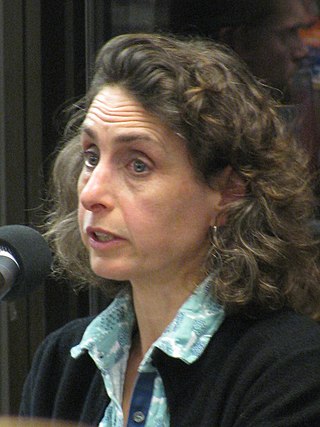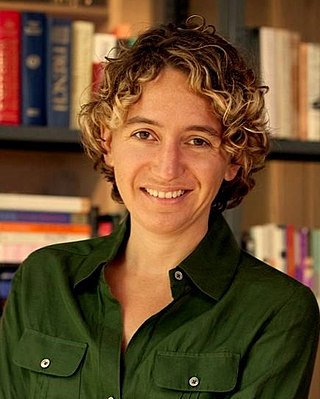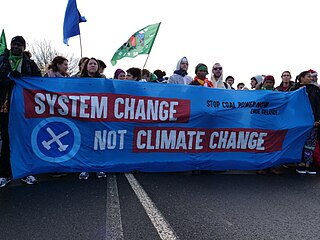Related Research Articles

Naomi Klein is a Canadian author, social activist, and filmmaker known for her political analyses; support of ecofeminism, organized labour, and leftism; and criticism of corporate globalization, fascism, ecofascism and capitalism. As of 2021, she is an associate professor, and professor of climate justice at the University of British Columbia, co-directing a Centre for Climate Justice.

A fossil fuel is a hydrocarbon-containing material such as coal, oil, and natural gas, formed naturally in the Earth's crust from the remains of dead plants and animals that is extracted and burned as a fuel. Fossil fuels may be burned to provide heat for use directly, to power engines, or to generate electricity. Some fossil fuels are refined into derivatives such as kerosene, gasoline and propane before burning. The origin of fossil fuels is the anaerobic decomposition of buried dead organisms, containing organic molecules created by photosynthesis. The conversion from these materials to high-carbon fossil fuels typically require a geological process of millions of years.

William Ernest McKibben is an American environmentalist, author, and journalist who has written extensively on the impact of global warming. He is the Schumann Distinguished Scholar at Middlebury College and leader of the climate campaign group 350.org. He has authored a dozen books about the environment, including his first, The End of Nature (1989), about climate change, and Falter: Has the Human Game Begun to Play Itself Out? (2019), about the state of the environmental challenges facing humanity and future prospects.

Joseph J. Romm is an American researcher, author, editor, physicist and climate expert, who advocates reducing greenhouse gas emissions to limit global warming and increasing energy security through energy efficiency and green energy technologies. Romm is a Fellow of the American Association for the Advancement of Science. In 2009, Rolling Stone magazine named Romm to its list of "100 People Who Are Changing America", and Time magazine named him one of its "Heroes of the Environment (2009)", calling him "The Web's most influential climate-change blogger".

Elizabeth Kolbert is an American journalist, author, and visiting fellow at Williams College.

References to climate change in popular culture have existed since the late 20th century and increased in the 21st century. Climate change, its impacts, and related human-environment interactions have been featured in nonfiction books and documentaries, but also literature, film, music, television shows and video games.

Climate crisis is a term describing global warming and climate change, and their impacts. This term and the term climate emergency have been used to describe the threat of global warming to humanity and the planet, and to urge aggressive climate change mitigation and "transformational" adaptation. In the scientific journal BioScience, a January 2020 article, endorsed by over 11,000 scientists worldwide, stated that "the climate crisis has arrived" and that an "immense increase of scale in endeavors to conserve our biosphere is needed to avoid untold suffering due to the climate crisis."
Greenpeace USA is the United States affiliate of Greenpeace International, an environmental nonprofit organization that spawned a social movement inspired by direct actions on the high seas to stop whaling and nuclear testing. Headquartered in Washington D.C., Greenpeace U.S.A. operates with an annual budget of approximately $40 million, employing over 500 people in 2020. The organization relies on donations from members, refuses corporate contributions and refrains from endorsing political candidates, though in 2020 Greenpeace USA issued climate scorecards for presidential candidates and ranked them from best to worst on climate

Kathryn Schulz is an American journalist and author. She is a staff writer at The New Yorker. In 2016, she won the Pulitzer Prize for Feature Writing for her article on the risk of a major earthquake and tsunami in the Pacific Northwest. In 2023, she won the Lambda Literary Award for Lesbian Memoir or Biography.

An energy transition is a significant structural change in an energy system regarding supply and consumption. Currently, a transition to sustainable energy is underway to limit climate change. It is also called renewable energy transition. The current transition is driven by a recognition that global greenhouse-gas emissions must be drastically reduced. This process involves phasing-down fossil fuels and re-developing whole systems to operate on low carbon electricity. A previous energy transition took place during the industrial revolution and involved an energy transition from wood and other biomass to coal, followed by oil and most recently natural gas.

Eric Holthaus is a meteorologist and climate journalist. He is the founder of a weather service called Currently and started a publication called The Phoenix on Ghost. He was formerly a writer for The Correspondent, Grist, Slate and The Wall Street Journal and is known for his mentions of global climate change.

The climate movement is a global social movement focused on pressuring governments and industry to take action addressing the causes and impacts of climate change. Environmental non-profit organizations have engaged in significant climate activism since the late 1980s and early 1990s, as they sought to influence the United Nations Framework Convention on Climate Change (UNFCCC). Climate activism has become increasingly prominent over time, gaining significant momentum during the 2009 Copenhagen Summit and particularly following the signing of the Paris Agreement in 2016.

Fossil fuel divestment or fossil fuel divestment and investment in climate solutions is an attempt to reduce climate change by exerting social, political, and economic pressure for the institutional divestment of assets including stocks, bonds, and other financial instruments connected to companies involved in extracting fossil fuels.

Climate change litigation, also known as climate litigation, is an emerging body of environmental law using legal practice to set case law precedent to further climate change mitigation efforts from public institutions, such as governments and companies. In the face of slow climate change politics delaying climate change mitigation, activists and lawyers have increased efforts to use national and international judiciary systems to advance the effort. Climate litigation typically engages in one of five types of legal claims: Constitutional law, administrative law, private law (challenging corporations or other organizations for negligence, nuisance, etc., fraud or consumer protection, or human rights.

The Uninhabitable Earth: Life After Warming is a 2019 non-fiction book by David Wallace-Wells about the consequences of global warming. It was inspired by his New York magazine article "The Uninhabitable Earth" (2017).
This article contains information about the literary events and publications of 2020.

All We Can Save is a 2020 collection of essays and poetry edited by Dr. Ayana Elizabeth Johnson and Dr. Katharine Wilkinson and published by One World. The collection sets out to highlight a wide range of women's voices in the environmental movement, most of whom are from North America. The book represents a wide range of essays, and creative works by over 50 women involved in climate change activism, science, and policy.

Elijah McKenzie-Jackson is a visual artist focused on common themes of climate justice, based in London and New York City, known for noting intersectional themes; for example indigenous rights. McKenzie-Jackson is co-founder at Waic Up, an organizer of Youth Strike for Climate, and is a United Nations Togetherband Ambassador. He is one of the organizers who started Fridays for Future UK, in February 2019.

Vic Barrett is an American climate activist. He is a plaintiff in Juliana v. United States and appeared in a documentary about the case, Youth v. Gov.
Genevieve Juliette Guenther is an American author and climate change activist. A former Renaissance scholar, she is the founding director of the media watchdog organization End Climate Silence. She is currently affiliate faculty at the Tishman Environment and Design Center at The New School. Her upcoming book, The Language of Climate Politics, is forthcoming from Oxford University Press.
References
- 1 2 Chris, Vognar (August 6, 2021). "Burning questions raised in 'Warmth'". The Boston Globe . Retrieved 2022-01-02.
- ↑ Clifford, Catherine (2021-08-19). "Grief and anxiety over climate change drove this 30-year-old to write a letter to his future child". CNBC. Retrieved 2022-01-02.
- 1 2 Balcetis, Emily (August 6, 2021). "Review | Climate science may change minds. Climate sadness can change hearts". Washington Post. ISSN 0190-8286 . Retrieved 2022-01-02.
- ↑ "Can We Find a New Way to Tell the Story of Climate Change?". The New Yorker. 2021-09-15. Retrieved 2022-01-02.
- ↑ Sherrell, Daniel (3 August 2021). Warmth: coming of age at the end of our world. New York, USA: Penguin Books. ISBN 978-0-14-313653-8. Paperback version.
- ↑ Institute, NYS Writers (2021-09-07). "Daniel Sherrell wins inaugural Bruce Piasecki and Andrea Masters writing award". NYSWritersInstitute. Retrieved 2022-01-02.
- ↑ Vendituoli, Monica. "Students fight climate change, cite personal reasons". USA TODAY. Retrieved 2022-01-02.
- ↑ Mulvaney, Katie. "Advocates call for more prisoners to be freed as COVID cases hit 600 at the ACI". The Providence Journal. Retrieved 2022-01-02.
- ↑ "Organizer Daniel Sherrell's first book examines growing up during the climate crisis". WAMC. Retrieved 2022-01-02.
- ↑ WARMTH | Kirkus Reviews.
- ↑ "The Best Books We Read in 2021". The New Yorker. 2021-12-13. Retrieved 2022-01-02.
- ↑ Sherrell, Daniel (2021-11-01). "Joe Manchin: who gave you authority to decide the fate of the planet? | Daniel Sherrell". the Guardian. Retrieved 2022-01-02.
- ↑ Sherrell, Daniel (25 July 2022). "If Biden isn't willing to really fight the climate crisis, he shouldn't run in 2024". The Guardian. London, United Kingdom. ISSN 0261-3077 . Retrieved 2022-07-25.
- ↑ "How an Aboriginal family beat back a fossil fuel conglomerate". Grist. 2021-04-14. Retrieved 2022-01-02.